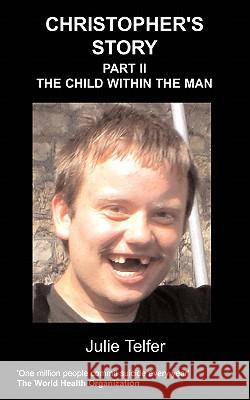Christopher's Story Part II » książka
Christopher's Story Part II
ISBN-13: 9781847473783 / Angielski / Miękka / 2008 / 156 str.
Description
Christopher's Story II has been written after the success of the original paperback, published in the hope of raising awareness of (Kanner's) autism and severe challenging behaviour. It continues the Telfer family's story of love and determination to remain together as opposed to place their son in residential care.
Julie Telfer wrote of the first book "I would truly love others to look beyond the disability and see Christopher for who he really is. I hope this book goes some way towards making this a reality." In Book II it becomes clear that her remarkable work and writing has changed the views of many but that the road towards fair and unprejudiced services and opportunities for all is far from over.
Luckily it also becomes clear that she, her family, and her son, have the determination to continue walking this road.
Book Extract
" INTRODUCTION
The autistic spectrum has held much fascination since Austrian-American psychiatrist and physician Leo Kanner presented his seminal paper back in 1943. A year later and unaware of his previous works, the Austrian paediatrician Hans Asperger's own landmark paper, describing autistic symptoms was also completed.
Whilst the former studies concentrated on children at the lower end of the spectrum, the latter studies were completed on higher-functioning children. But together, the resulting papers form the basis of the modern study of autism and encompass many conditions such as Attention Deficit Hyperactivity Disorder, Fragile X syndrome, Asperger syndrome and of course, Kanner autism.
The spectrum itself is vast and whilst all affected individuals will have varying degrees of development and/or behaviour traits, which are characteristic of the condition, for individuals placed at the lowest end of the spectrum, the level of learning disabilities present will be more profound.
In recent years there has been much emphasis placed on the syndrome known as Asperger, with little reference being made to those affected by Kanner autism.
However, this book gives an insight into what it is actually like to live in family where one of its members is placed on the lowest end of the spectrum and continues our son's story as he enters into adulthood.
Description Christophers Story II has been written after the success of the original paperback, published in the hope of raising awareness of (Kanners) autism and severe challenging behaviour. It continues the Telfer familys story of love and determination to remain together as opposed to place their son in residential care. Julie Telfer wrote of the first book "I would truly love others to look beyond the disability and see Christopher for who he really is. I hope this book goes some way towards making this a reality".In Book II it becomes clear that her remarkable work and writing has changed the views of many but that the road towards fair and unprejudiced services and opportunities for all is far from over.Luckily it also becomes clear that she, her family, and her son, have the determination to continue walking this road.Book ExtractINTRODUCTIONThe autistic spectrum has held much fascination since Austrian-American psychiatrist and physician Leo Kanner presented his seminal paper back in 1943. A year later and unaware of his previous works, the Austrian paediatrician Hans Aspergers own landmark paper, describing autistic symptoms was also completed.
Whilst the former studies concentrated on children at the lower end of the spectrum, the latter studies were completed on higher-functioning children. But together, the resulting papers form the basis of the modern study of autism and encompass many conditions such as Attention Deficit Hyperactivity Disorder, Fragile X syndrome, Asperger syndrome and of course, Kanner autism.
The spectrum itself is vast and whilst all affected individuals will have varying degrees of development and/or behaviour traits, which are characteristic of the condition, for individuals placed at the lowest end of the spectrum, the level of learning disabilities present will be more profound.
In recent years there has been much emphasis placed on the syndrome known as Asperger, with little reference being made to those affected by Kanner autism.
However, this book gives an insight into what it is actually like to live in family where one of its members is placed on the lowest end of the spectrum and continues our sons story as he enters into adulthood.











